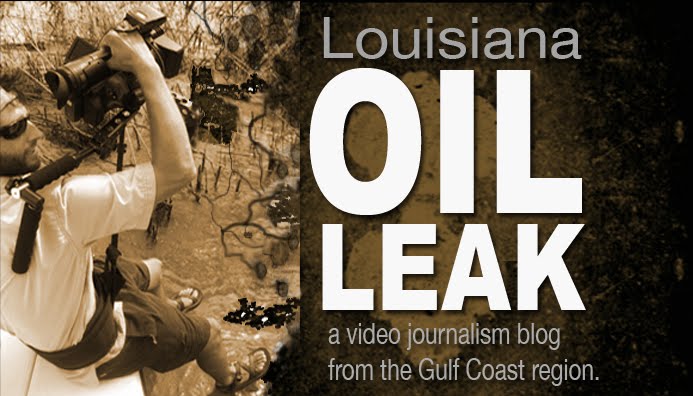Today I went to
Delacroix Island in St. Bernard Parish. Throughout the 19th and early 20th centuries Delacroix was a thriving village of Spanish families that found sustenance in the waters and marshes of the Breton Sound Basin. I myself am a descendant of these people who call themselves
Los Isleños. Today, most of the original Spanish families have left Delacroix for higher ground in the western parts of St. Bernard Parish. Still, some Isleños have remained, choosing to continue the traditional way of life as fishermen.
My first stop was at the
Destination Delacroix Fishing Lodge where its owner Freddie Dietz was doing some long over-due maintenance to his place. Normally, Freddie would be taking his charter clients out for some early summer speckled-trout fishing, but because the Louisiana Dept of Wildlife and Fisheries has closed fishing in the
Breton Sound Basin under pressure of the encroaching oil leak, Freddie was on dry land today.
I talked with Freddie about what the oil leak meant for the productive estuary where he makes a living. He certainly was alarmed, but he showed it with the resilience it took to survive multiple hits to his business from hurricanes Katrina, Ike, and Gustav.
Freddie also told me why the oil leak could be devastating to the estuary. He explained that this the time of year marks the beginning of the life cycle for many of the species of wildlife that inhabit the area and a strike during this stage could deplete their abundance for many years to come.
After talking with Freddie for a bit, I made my way up Delacroix Highway back towards the western end of the parish. I didn't go far before I ran into a old timer who I knew was an Isleño upon first sight. I can't explain how I knew, but those from the area will know what I mean.
I got out of my car and introduced myself and before long the man and I had determined that we were actually third cousins. His mother and my great-grandfather were sister and brother. I was not surprised.
The man's name was Thomas Gonzales, 71-years-old., and he has been a fisherman since he was old enough to work on a boat. We sat and talked under his mobile home which he had raised 17 feet off the ground in 2007. Mr. Thomas told me about oil spills that had happened in the interior marshes many years ago. The clean-up method back then was to burn the affected marsh, and let a new layer of grass grow from below the ash. This process is something that is being considered if the current BP leak finds its way into the marshes.
Mr. Thomas told me, as many others have, that the oil leak will be much worse for the estuary than a hurricane. He was fishing crabs only 3 months after Katrina, but if the oil gets into the marsh he had little faith that it would recover soon.

